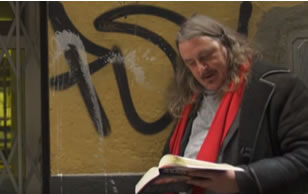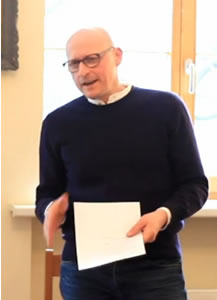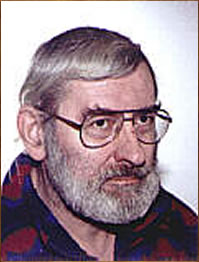De Duitse schrijver en regisseur Einar Schleef werd in 1944 geboren in Sangershausen, Thüringen. Zie ook mijn blog van 17 januari 2009.
Uit: “Tod eines Lehrers” in DIE BANDE.
„[…] Eine Frau die früh 4 bis abends 11 stramm gearbeitet hat verkommt. In ersehnter Rentenruhe den Lebensabend genießen. Davon macht Ihr Euch kein Bild, schreib und schärf das auch Deinem Bruder ein. Ich meckere nicht, aber wenn ich auf dem Schragen liege, wer kümmert sich um mich, beide einfach abhauen.
Wer fragt nach mir.
Ich nummeriere meine Briefe, aber was machst Du. Ich habe Deine ganze Reise auf der Karte verfolgt, Dein Schulatlas liegt auf dem Schreibtisch genau vor Vatis Bild, kann er auch sehen wo Du Dich rumtreibst. Einfach fabelhaft. Manchen Abend blättere ich drin rum, überall der Stempel der Oberschule, daß Du Dich nicht schämst, wenn man den Atlas bei mir findet. Die Feierlichkeiten für die Lehrer sollen schon vorbei sein, da klingle ich einfach heute Abend, steh vor der Tür. Ich habe herrliche weiße Gladiolen. Vati hab ich auch seine rausgetragen. Wieviel Jahre du mich vertröstet, wir kümmern uns gemeinsam um einen Stein, es ist bis jetzt keiner draußen. Rings alles pompös, keiner denkt, ich kann den mir nicht leisten, das ist lächerlich, man denkt, ich will ihn nicht. Vati wünschte sich einen Findling, den soll er erhalten aber woher. Ich tigere durch die Umgebung, rauf zur Schachthalde, nirgendswo ein geeigneter zu entdecken, ja wär ich früher drauf gekommen, den Friedhofsgärtner mit Intershop eingepackt, hätte der Vati einen, hinten die alte Schrift ab und die unsere neu. In Gold oder Natur. Oder einfach Schwarz. Ich habe soviele Fragen an Dich und kein Mensch ist da. Aber daß ich so völlig von der Welt abgeschnitten, wer sich das denken können. Jammern, ich kann hier nicht weg, müßte ja den Vati ausbuddeln und wo sollte ich hin, euch folgen, nein der Vati hält mich fest, das ist auch besser so.
Schreib Deinem Lehrer. Wieoft warst Du bei ihm. Kannst Du das einfach vergessen. Ich bin ja unwichtig. Die Laster donnern am Gaswerk vorbei, jeden Tag, die Lampe zittert, der Schreibtisch wackelt. Ich bin alt geworden, muß mich jedesmal festhalten. Abends stiebt der Qualm durch die Mogkstraße, rote Funken mache sofort die Fenster zu, früh sitzen trotzdem dicke, schwarze Noppen in der Gardine.
Hoffentlich erreicht Dich mein Brief und antworte sofort.
Dich lieb grüßend
Deine Mutter.
Einar Schleef (17 januari 1944 – 21 juli 2001)
De Duitse dichter Klaus M. Rarisch werd geboren op 17 januari 1936 in Berlijn. Zie ook mijn blog van 17 januari 2009.
Deep blue
Viele Zwerge glauben: Klein
sind wir an Statur und Klasse,
aber nicht an Zahl und Masse.
Schraube los? Wir schrauben ein!
Macht aus faulen Trauben Wein,
doch laßt ab von eurem Hasse
gegen unsre Däumlingsrasse,
laßt das Bauernrauben sein!
Was wir in das Blech gesteckt,
das hat Int’ligenz geweckt,
adelt Variantenschutt!
Was der Gegner auch bezweckt –
wir sind schneller, sind perfekt!
Input … Output … Liliput.
Tod im Café
Ein Dichter will sich aufs Papier verschwenden –
Statt dessen nimmt ein Weib an ihm Gefallen.
Man trinkt und schweigt in langen Intervallen.
Dem Dichter zieht es süßlich in den Lenden …
Da flammt sie auf – der Wein aus den Kristallen
Verzischt, als Essig rinnt er von den Wänden –
Manon hielt eben Flieder noch in Händen? –
Jetzt krampft sie Asche in geborstnen Krallen.
Ringsher fängt zähes Lachen an zu fließen,
Wie Sand aus einem leeren Portemonnaie.
Die Kellner lassen es sich nicht verdrießen –
Der Dichter zahlt und hetzt aus dem Café.
Er muß sich jetzt in freie Rhythmen gießen:
Die liest er morgen auf der Sturmsoirée!
Klaus M. Rarisch (Berlijn, 17 januari 1936)
De Amerikaanse dichter William Edgar Stafford werd geboren op 17 januari 1914 in Hutchinson, Kansas. Zie ook mijn blog van 17 januari 2009.
When I Met My Muse
I glanced at her and took my glasses
off–they were still singing. They buzzed
like a locust on the coffee table and then
ceased. Her voice belled forth, and the
sunlight bent. I felt the ceiling arch, and
knew that nails up there took a new grip
on whatever they touched. “I am your own
way of looking at things,” she said. “When
you allow me to live with you, every
glance at the world around you will be
a sort of salvation.” And I took her hand.
Notice What This Poem Is Not Doing
The light along the hills in the morning
comes down slowly, naming the trees
white, then coasting the ground for stones to nominate.
Notice what this poem is not doing.
A house, a house, a barn, the old
quarry, where the river shrugs–
how much of this place is yours?
Notice what this poem is not doing.
Every person gone has taken a stone
to hold, and catch the sun. The carving
says, “Not here, but called away.”
Notice what this poem is not doing.
The sun, the earth, the sky, all wait.
The crowns and redbirds talk. The light
along the hills has come, has found you.
Notice what this poem has not done.
William Stafford (17 januari 1914 – 28 augustus 1993)
De Vlaamse schrijver Jan Van Droogenbroeck werd geboren te Sint-Amands op 17 januari 1835. Zie ook mijn blog van 17 januari 2007 en ook mijn blog van 17 januari 2009.
Het zieke broerken
De moeder zit aan ’t vensterraam,
Zij heeft een kind op haren schoot
En vouwt de handen biddend saam:
Ons broederken is bijna dood!
[p. 50] Hoe ligt het daar, op haren schoot,
Wat is het bleek, het arme wicht!
Mijn broederken is bijkans dood,
Dat nog op ons zijne oogen richt.
Wat ziet het bleek, het arme wicht!
Het legt zijn hoofdje moede neer
Terwijl ’t op ons zijn oogen richt;
Want het bemint ons nog zoo teer!
Het legt het moede hoofdje neer
En zoekt in moeders armen rust.
Ach! het bemint ons nog zoo teer:
Het heeft ons gistren nog gekust…
Nu zoekt het bij de moeder rust.
Het wilde,…. maar en kan niet meer,
Het heeft ons gistren nog gekust:
Omarm ons, lieve, nog een keer!
Het wil wel, maar het kan niet meer!

Jan Van Droogenbroeck (17 januari 1835 – 27 mei 1902)
De Surinaamse schrijfster en beeldend kunstenares Dorothee Wong Loi Sing werd geboren in Paramaribo op 17 januari 1954. Zie ook mijn blog van 17 januari 2009.
Uit: Witmans hel
„Daar gaan ze dan: vergezeld van een voortdurend innerlijk kontakt met mij, de Mamaisa, die de hoogmoedswaanzin, het onterechte superioriteitsgevoel, en de hebzuchtige egocentriciteit van de valse broeders en zusteren wil nivelleren.
In mij sluimeren ook onrustig de Witmensen, geplaagd door angstige voorspellende visioenen van hel en verdoemenis, want hoe goed hebben zij geweten, dat hun daden niet tot in alle eeuwigheid ongestraft zouden blijven, en dat zij de verstikte stem van hun eigen geweten niet voor immer zouden kunnen blijven negeren. Onrustig sliepen hun beenderen in mij, bedekt door marmeren praalgraven met lovende in-memoriams: de Suzanna Duplessis’en, de Cecil Rhodes’en, de tallozen. Onrustig keerden hun schimmen telkens en telkens terug naar de plaatsen waar zij hun wandaden bedreven hadden, tot zelfs de minst gevoelige arbeider, wandelaar of toerist op voormalige executieplaatsen, voormalige slavenplantages, in musea en antiekzaken (waar nog authentieke brandijzers en folterwerktuigen te koop zijn! Om als versiering voor je huis te dienen!) het gevoel kreeg, iets op te hebben gevangen van een echo uit het schuldige verleden. Ook de witmensen van toen bekleed ik met nieuw vlees, maar ik plaats ze in parallelle werelden, waar de historie ná hun succesvolle historische wandaden nèt iets anders verloopt Enkelen ge-
[p. 186]nieten de twijfelachtige eer, in dezelfde parallelwereld te mogen reïncarneren, waar ze in historische tijden zo’n ongebreidelde macht uitoefenden en aanzien genoten. Daar zullen ze verdwaald en angstig moeten toezien, hoe de afstammelingen der slaven nu gelijk zijn in velerlei, of zelfs superieur in sommige aspecten. En dan laat ik ze lòs, allen, op het door hen gekozen tijdstip.
En verklaar de ‘jacht’ voor geopend.“
Dorothee Wong Loi Sing (Paramaribo, 17 januari 1954)
De Engelse schrijver Nevil Shute werd geboren op 17 januari 1899 in Ealing. Zie ook mijn blog van 17 januari 2009.
Uit: The Far Country
„They went back to the hotel, and rested for a time in the lounge with glasses of cold beer, and dined, and went out to see Worm’s Eye View, and laughed themselves silly. They got up late by their standards next day, and early by those of the hotel, and went down to their breakfast in the dining room. As country folk they were accustomed to a cooked breakfast and the hotel was accustomed to station people; half a pound of steak with two fried eggs on top of it was just far enough removed from normal to provide a pleasant commencement for the day for Jack. Jane ate more modestly – three kidneys on toast and a quarter of a pound of bacon. Fortified for their day’s work they set out to look at pictures with a view to buying one.
The first gallery they went to was full of pictures of the central Australian Desert. The artist had modeled his style upon that of a short-sighted and eccentric old gentleman called Cezanne, who had been able to draw once but had got tired of it; this smoothed the path of his disciples a good deal. The Dormans wandered, nonplused, from mountain after mountain picture, glowing in rosy tints, all quite flat upon the canvas, with queer childish brown scrawls in the foreground that might be construed into aboriginals. A few newspaper clippings, pinned to the wall, hailed the artist as one of the outstanding landscape painters of the century.
Jack Dorman, deep in gloom at the impending waste of money, said, “Which do you like best? That’s a nice one, over there.”
Jane said, “I don’t like any of them. I think they’re horrible.”
“Thank God for that,” her husband replied. The middle-aged woman seated at the desk looked at them with stern disapproval.
They went out into the street. “It’s this modern stuff,” Jane said. “That’s not what I want at all.”
“What is it you want?” he asked. “What’s it got to be like?”
She could not explain to him exactly what she wanted, because she did not know herself. “It’s got to be pretty,” she said, “and in bright colours, in oils, so that when it’s raining or snowing in the winter you can look at it and like it. And it’s got to be like something, not like those awful daubs in there.”
The next gallery that they went into had thirty-five oil paintings hung around the walls. Each picture depicted a vase of flowers standing on a polished table that reflected the flowers and a curtain draped behind; thirty-five oil paintings all carefully executed, all with the same motif. A few newspaper cuttings pinned up announced the artist as the outstanding flower painter of the century.“
Nevil Shute (17 januari 1899 – 12 januari 1960)
De Engelse schrijfster Mrs Henry Wood werd geboren in Worcester op 17 januari 1814 als Ellen Price. Zie ook mijn blog van 17 januari 2009.
Uit: Reality Or Delusion?
„THIS is a ghost story. Every word of it is true. And I don’t mind confessing that for ages afterwards some of us did not care to pass the spot alone at night. Some people do not care to pass it yet.
It was autumn, and we were at Crabb Cot. Lena had been ailing; and in October Mrs. Todhetley proposed to the Squire that they should remove with her there, to see if the change would do her good.
We Worcestershire people call North Crabb a village; but one might count the houses in it, little and great, and not find four-and-twenty. South Crabb, half a mile off, is ever so much larger; but the church and school are at North Crabb.
John Ferrar had been employed by Squire Todhetley as a sort of overlooker on the estate, or working bailiff. He had died the previous winter; leaving nothing behind him except some debts; for he was not provident; and his handsome son Daniel. Daniel Ferrar, who was rather superior as far as education went, disliked work: he would make a show of helping his father, but it came to little. Old Ferrar had not put him to any particular trade or occupation, and Daniel, who was as proud as Lucifer, would not turn to it himself. He liked to be a gentleman. All he did now was to work in his garden, and feed his fowls, ducks, rabbits, and pigeons, of which he kept a great quantity, selling them to the houses around and sending them to market.
But, as every one said, poultry would not maintain him. Mrs. Lease, in the pretty cottage hard by Ferrar’s, grew tired of saying it. This Mrs. Lease and her daughter, Maria, must not be confounded with Lease the pointsman: they were in a better condition of life, and not related to him. Daniel Ferrar used to run in and out of their house at will when a boy, and he was now engaged to be married to Maria. She would have a little money, and the Leases were respected in North Crabb.“
Mrs Henry Wood (17 januari 1814 – 10 februari 1887)
De Engelse schrijver, politicus en staatsman George Lyttelton, 1e Baron Lyttelton werd geboren in Hagley, Worcestershire op 17 januari 1709. Zie ook mijn blog van 17 januari 2009.
Uit: Dialogues of the Dead
„_Mr. Hampden_.–I wished for peace too, as ardently as your lordship, but I saw no hopes of it. The insincerity of the king and the influence of the queen made it impossible to trust to his promises and declarations. Nay, what reliance could we reasonably have upon laws designed to limit and restrain the power of the Crown, after he had violated the Bill of Rights, obtained with such difficulty, and containing so clear an assertion of the privileges which had been in dispute? If his conscience would allow him to break an Act of Parliament, made to determine the bounds of the royal prerogative, because he thought that the royal prerogative could have no bounds, what legal ties could bind a conscience so prejudiced? or what effectual security could his people obtain against the obstinate malignity of such an opinion, but entirely taking from him the power of the sword, and enabling themselves to defend the laws he had passed?
_Lord Falkland_.–There is evidently too much truth in what you have said. But by taking from the king the power of the sword, you in reality took all power. It was converting the government into a democracy; and if he had submitted to it, he would only have preserved the name of a king. The sceptre would have been held by those who had the sword; or we must have lived in a state of perpetual anarchy, without any force or balance in the government; a state which could not have lasted long, but would have ended in a republic or in absolute dominion.“
George Lyttelton (17 januari 1709 – 24 augustus 1773)
Zie voor onderstaande schrijver ook mijn blog van 17 januari 2009.
De Duitse schrijfster Hella Eckert werd geboren op 17 januari 1948 in Bremen.



















